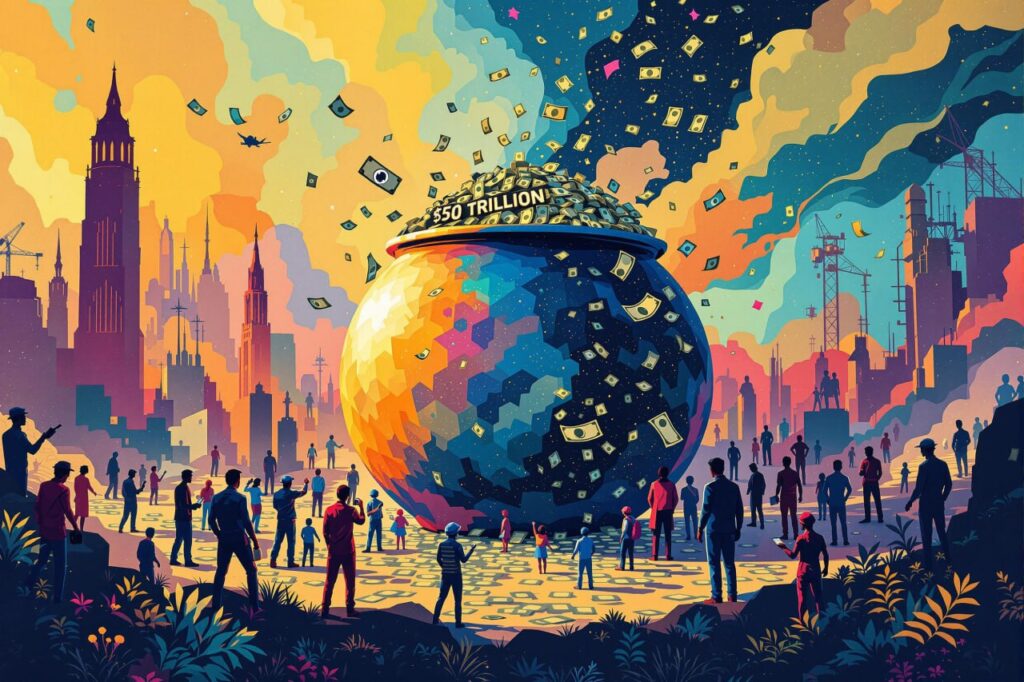We dedicate a quarter of our lives to work. With a global workforce of approximately 3.38 billion people, we collectively contribute over 6 trillion hours annually to our professions. These staggering numbers not only reflect our commitment but also highlight the immense value of our most precious commodity: time.
As we stand on the brink of a new era, early forecasts by McKinsey suggest that by 2030, artificial intelligence could automate up to 30% of full-time equivalent positions, amounting to 1.8 trillion hours per year. Moreover, current AI technology has the potential to automate 60-70% of all occupational tasks, translating to over 4 trillion hours annually. This shift isn’t just about numbers; it’s about redefining the very essence of work and how we value our time.
The Transition: From Attention to Automation
The Opinion Era (2003–2023) was the age of unleashed expression, where platforms like Facebook, YouTube, and Twitter turned everyone into content creators. The result was an explosion of user-generated content that reshaped how humanity shared and consumed information. Yet, this democratization came at a cost. Algorithms trained to prioritize engagement over accuracy transformed the internet into an attention-driven battleground, where the loudest voices—not the most truthful—reigned supreme.
The consequences were profound. Information became a product of influence rather than insight, with sensationalism outshining substance. Echo chambers grew louder, misinformation spread faster, and the chaos of infinite opinions overshadowed the pursuit of objective knowledge. Amidst this digital noise, the true value of information became elusive.
By 2023, the emergence of generative AI signaled a seismic shift. Technologies like GPT models and transformer architectures didn’t just promise to organize the deluge of data from the Opinion Era—they offered a way to move beyond it. This transition ushered in the Knowledge Era, a time defined not by the breadth of information but by its clarity, precision, and application. AI has begun mining centuries of accumulated knowledge to distill actionable insights, cutting through the noise with unprecedented speed and accuracy.
This shift is more than just a technological milestone; it marks the end of the attention economy and the beginning of the automation economy. The battlefield has moved from capturing attention to capturing automation market share—the “automatable hours market” comprising billions of hours across every sector of the global economy. With a global workforce contributing 6 trillion hours annually, McKinsey forecasts that up to 30% of this could be automated by 2030, unlocking 1.8 trillion hours of labor. Current AI capabilities already point to even larger potential, with 60–70% of occupational tasks—over 4 trillion hours annually—ripe for automation.
A striking measure of this transition lies in the revenues of UiPath and Google in 2022. UiPath, a leader in automation, generated $892.3 million, dwarfed by Google’s $224.47 billion in advertising revenue. This disparity illustrates the entrenched dominance of the attention economy. Yet, it also reveals the untapped potential of automation—a market poised to reshape work, productivity, and the value of time itself.
The automation economy represents the golden opportunity of our time. The participants in this new battlefield are fighting to capture market share in an era where time—freed from routine tasks—becomes the most valuable resource. The winners will redefine not just work but the fundamental relationship between humanity and technology, unlocking a future where automation enables us to work smarter, live better, and reclaim the true value of time.
The Autonomisation Gold Rush
As automation becomes increasingly sophisticated, we are witnessing what could be termed an “autonomisation gold rush.” Yet, the benefits of this technological shift are not felt equally amongst its buyers. For businesses, automation often translates into economic performance gains: reduced costs, increased efficiency, and higher profits. A company might save 1,000 hours through automation, and while this could improve bottom lines, the tangible benefits often concentrate among a few—executives enjoy higher margins, shareholders see increased dividends, and, in some cases, jobs are lost in the process.
For independent professionals, however, the stakes are profoundly different. A freelancer who leverages automation to reclaim just 10 hours a week doesn’t just see a line item on a balance sheet improve; they get their life back. It could mean more time with family, the ability to pursue passions, attend a music festival, or take a much-needed holiday. The value of those reclaimed hours isn’t abstract—it’s deeply personal and transformative.
This is where Firesight positions itself as a different kind of automation company. While many automation providers focus on B2B markets, selling technology to deliver cost savings and profitability, Firesight is selling something far more tangible: time as a product. For the freelancer, the entrepreneur, or the independent professional, our platform represents the ability to take control of their time, break free from the constraints of routine work, and reinvest those hours into what matters most.
By democratizing access to the benefits of automation, Firesight challenges the traditional narrative of concentrated wealth breeding more concentrated wealth. In a world where companies saving thousands of hours often translate those gains into profits for the few, we’re focused on redistributing the value of automation to the many. For independent professionals, the return on automation is real and immediate—it’s about changing lives, not just balance sheets.
Time Saved: Firesight’s True Measure of Success
At Firesight, our most important metric isn’t revenue or user growth—it’s time saved. Every hour we reclaim for our customers represents more than efficiency; it’s freedom. Freedom to spend time with loved ones, pursue passions, or simply enjoy life.
This is the essence of our mission: to give people their lives back. By saving time, we earn loyalty not through profit-driven metrics, but by delivering what matters most—more moments to live fully. In the automation economy, time is the ultimate currency, and at Firesight, it’s the only KPI that truly counts.

